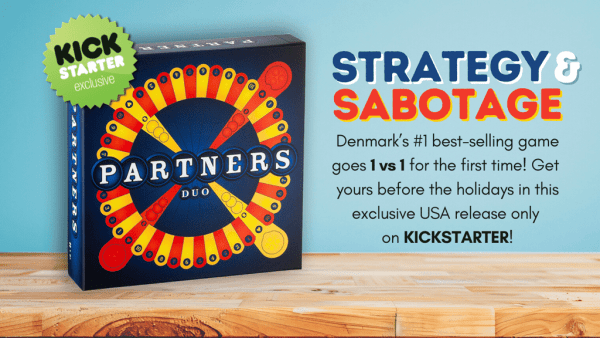Preview: Partners Duo Offers a Classic Race Around the Board with a Modern Twist

A modern twist on classic board games, Partners Duo offers a strategic duel where players navigate a circular board, blocking their opponent and racing to the finish.
Currently on Kickstarter, Partners Duo is a two-player version of Partners, a game we’ve previously reviewed and one of the best-selling games in Denmark.
Gameplay
There are two yellow starting circles on opposite sides of the board from each other, and two starting orange circles on opposite sides from each other. Each one opens into a starting space that is part of the board’s main circle of spaces. Both players take six pawns of their player color; three have bumps and three have dents. A player puts his three bump pawns on one starting circle and his three dented ones on the other. Also connected to each player’s starting space are the ending spaces for those three panws. The goal of the game is to get all six of your pawns out onto the circle, all around the board, and onto those ending spaces.
Each round starts with four cards being dealt to each player. Both players look at their cards and pass one to the other person. Players then take turns playing cards until they have no legal card to play, or they have played all their cards. New cards are then dealt and play continues in the same way. After players have gone through three hands, all the cards are reshuffled together and play continues as previously described.
To move a pawn from a starting circle onto its starting space, a player must play a card with a heart icon. Another pawn cannot pass a starting space if a player has a pawn there. This includes pawns controlled by the same player, but which originate from the other starting circle. There is only one card type in the deck that allows you to pass a blocked starting space.
When a player plays a card, he resolves the action listed on it. This typically lets him move his pawn a certain number of spaces forward on the board. Some allow him to swap his pawn with another pawn at a different location. One allows him to divide four points of movement between any of his pawns that are of the same type.
If a player lands his pawn on a space that is occupied by his opponent's pawn (or by his own pawn on the other starting circle), the new pawn remains and the other pawn is sent back to its starting circle. However, if there is more than one other pawn on that space, then the new pawn goes back to its starting circle instead.
For a pawn to reach its final goal, a card must be played that moves it the exact number of spaces to end movement on the innermost empty ending space — then it is locked in and may no longer be moved. If a card is played with too many movement points, it moves backward the excess number of movement points once it has reached this space.

Review
Partners Duo blends very traditional board games with more strategic gameplay. It has the aesthetics of a roll-and-move but there’s more strategy and control. Players are trying to block each other, but also trying not to block themselves. You need to decide which card to pass while also weighing how you want to move your pieces.
There’s still some luck of the draw, but it feels more like a challenge to work with each turn. Players do have to pass if they fail to draw any heart cards when they don’t have any pieces moving around the board, but this never felt like it destroyed our chances of winning. Typically, you have interesting choices to engage with. Which card do you pass to your opponent? Which of your six pawns will you choose to move for each of your cards?
It’s quite an easy game to teach and set up, and it feels accessible to players without a lot of gaming experience, especially because it does look so similar to classic games such as Sorry. It’s a nice meeting point between old and new gaming.
The mechanic of sending pieces back to the start does mean that the game can drag on if players have a run of bad luck, and unfortunately, there’s not a better way to control game time.
Overall, this is a nice two-player game that is fun and casual. It’s pleasant to play something that feels reminiscent of older games while bringing more to the table and not overcomplicating its rules. Check it out on Kickstarter.
Pros: Simple design with elements of strategy, quite accessible
Cons: Can run too long depending on how often pieces get knocked back to their start
Disclosure: This is a paid preview of a game that is seeking funding on Kickstarter.




